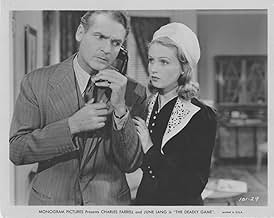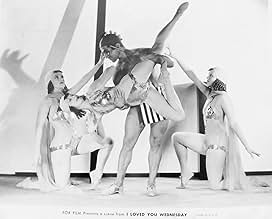June Lang(1917-2005)
- Actress
- Soundtrack
This approachable blue-eyed blonde with a striking, open-faced beauty
had a very encouraging career going for her in 30s Hollywood but
extenuating circumstances hurt her chances in the long run. In less
than a decade and a half June Lang was out of pictures altogether
(after appearing in over 30) and therein was glimpsed here and there on
TV and commercials until her full retirement. Although June never lost
her stunning looks and vivacity, she never managed to return, although
she indeed contemplated it from time to time.
Born in Minneapolis, Minnesota as Winifred June Vlasek on May 5, 1917, June was encouraged to perform at a young age. Dancing at school functions and local amateur Elks Club events from age five, her family moved to Hollywood when she was around seven. There the child joined up with the "Meglin Kiddies" revues and performed with the outfit in various vaudeville shows. Attending the Hollywood Professional School, she matured quickly and began finding jobs in various chorus lines, including one at the Orpheum Theatre. The thirteen-year-old was even cast in the show "Temptations of 1930" after convincing the dance director she was 18.
June made an inauspicious debut in pictures as an extra in Young Sinners (1931) and was again unbilled in Barbara Stanwyck's The Miracle Woman (1931) and Janet Gaynor's Daddy Long Legs (1931). Fox Studios took an interest in her after the director of She Wanted a Millionaire (1932), John G. Blystone, saw bright promise in June after she performed a brief swimming pool bit. Given her first speaking role, a featured femme part, in Chandu the Magician (1932) starring Edmund Lowe and a scene-stealing Bela Lugosi, June's career began a steady incline.
Billed as June Vlasek at first and seen prominently in such films as The Man Who Dared (1933) and I Loved You Wednesday (1933), June received the second femme lead role in the plush yet whimsical, operetta-styled Music in the Air (1934) top-lining John Boles and Gloria Swanson, who played a temperamental Teutonic diva. Adapted from the 1932 Broadway show with a Billy Wilder screenplay and songs composed and written by Jerome Kern and Oscar Hammerstein II, second lead ingénues June (now billed June Lang) and her partner Douglass Montgomery actually received more focus than the stars. June followed this with the Hal Roach-produced Laurel and Hardy comedy Bonnie Scotland (1935). She would work again with Hardy in his solo movie effort Elephants Never Forget (1939).
Fox did not renew June's contract in 1935 after production chief Winifield Sheehan, who had taken a professional interest in June, left the studio. Yet within a year she was back in the fold when the new studio casting director spotted her dancing at The Trocadero Club. June made one of her most impressive films at Fox in 1936, the war-themed The Road to Glory (1936) with the 19-year-old playing opposite the more-seasoned Fredric March and Warner Baxter. In addition to such regular fare as The Country Doctor (1936), which showcased the newsworthy Dionne Quintuplets, and Ali Baba Goes to Town (1937), in which she played a beautiful princess, June is perhaps best remembered for her co-starring roles in two Shirley Temple hearttuggers: Captain January (1936), in which she played a schoolteacher, and Wee Willie Winkie (1937), in which she portrayed Shirley's widowed mother. As fate would have it, the extremely photogenic June was relegated primarily to decorative roles in "B" films for the most part, but she tried to make the most of it until fate intervened and the beginning of the end began to show itself.
Fox sent June to England in 1938 to film So This Is London (1939) but the threat of war there so terrified her that she abandoned the set and returned home. Fox quickly ended her contract for making that choice. Worse yet, a disastrous and ill-conceived 1939 marriage to handsome Chicago mobster Johnny Roselli tarnished her Hollywood reputation completely. Roselli later became pals with film producer Bryan Foy and was brought into Foy's minor company, Eagle Lion Studios, to serve as a producer of a few gangster movies.
Although June maintained that she was initially naive to her husband's mob-related activities and the couple did eventually divorced in 1943 (Roselli was indicted and convicted of racketeering during their marriage and later found murdered amid controversy in 1976 at age 71), her career never recovered from such bad press. 1941 and 1942 were her last productive years as a "B" co-star with the "Poverty Row" offerings Too Many Women (1942), The Deadly Game (1941) and City of Silent Men (1942) most representative of what she was handed.
She made fleeting appearances after that, some of which were unbilled, and ended her movie career passively with the second-string programmers Three of a Kind (1944) Lighthouse (1947). TV appearances were sporadic come the 1950s and early 1960s. She was the on-the-air "telephone girl" for a local Los Angeles talk show for a time, pitched products on TV, and also served as a photo model before she gracefully left the limelight altogether.
June's first brief marriage (1937-1938) was to playboy agent-turned-producer Victor M. Orsatti). A third marriage to Lt. William Morgan in 1944 produced her only child, Patricia (she suffered a miscarriage earlier). The marriage to Morgan, who later became a businessman, ended bitterly in 1954 and June never remarried. In later years both her mother and daughter lived with her in her North Hollywood home. Daughter Patricia dedicated her life to working with handicapped children, at one time working for the Lowman School in the Los Angeles valley area. June died shortly after her 88th birthday and was buried at Forest Lawn Cemetary in Los Angeles.
Born in Minneapolis, Minnesota as Winifred June Vlasek on May 5, 1917, June was encouraged to perform at a young age. Dancing at school functions and local amateur Elks Club events from age five, her family moved to Hollywood when she was around seven. There the child joined up with the "Meglin Kiddies" revues and performed with the outfit in various vaudeville shows. Attending the Hollywood Professional School, she matured quickly and began finding jobs in various chorus lines, including one at the Orpheum Theatre. The thirteen-year-old was even cast in the show "Temptations of 1930" after convincing the dance director she was 18.
June made an inauspicious debut in pictures as an extra in Young Sinners (1931) and was again unbilled in Barbara Stanwyck's The Miracle Woman (1931) and Janet Gaynor's Daddy Long Legs (1931). Fox Studios took an interest in her after the director of She Wanted a Millionaire (1932), John G. Blystone, saw bright promise in June after she performed a brief swimming pool bit. Given her first speaking role, a featured femme part, in Chandu the Magician (1932) starring Edmund Lowe and a scene-stealing Bela Lugosi, June's career began a steady incline.
Billed as June Vlasek at first and seen prominently in such films as The Man Who Dared (1933) and I Loved You Wednesday (1933), June received the second femme lead role in the plush yet whimsical, operetta-styled Music in the Air (1934) top-lining John Boles and Gloria Swanson, who played a temperamental Teutonic diva. Adapted from the 1932 Broadway show with a Billy Wilder screenplay and songs composed and written by Jerome Kern and Oscar Hammerstein II, second lead ingénues June (now billed June Lang) and her partner Douglass Montgomery actually received more focus than the stars. June followed this with the Hal Roach-produced Laurel and Hardy comedy Bonnie Scotland (1935). She would work again with Hardy in his solo movie effort Elephants Never Forget (1939).
Fox did not renew June's contract in 1935 after production chief Winifield Sheehan, who had taken a professional interest in June, left the studio. Yet within a year she was back in the fold when the new studio casting director spotted her dancing at The Trocadero Club. June made one of her most impressive films at Fox in 1936, the war-themed The Road to Glory (1936) with the 19-year-old playing opposite the more-seasoned Fredric March and Warner Baxter. In addition to such regular fare as The Country Doctor (1936), which showcased the newsworthy Dionne Quintuplets, and Ali Baba Goes to Town (1937), in which she played a beautiful princess, June is perhaps best remembered for her co-starring roles in two Shirley Temple hearttuggers: Captain January (1936), in which she played a schoolteacher, and Wee Willie Winkie (1937), in which she portrayed Shirley's widowed mother. As fate would have it, the extremely photogenic June was relegated primarily to decorative roles in "B" films for the most part, but she tried to make the most of it until fate intervened and the beginning of the end began to show itself.
Fox sent June to England in 1938 to film So This Is London (1939) but the threat of war there so terrified her that she abandoned the set and returned home. Fox quickly ended her contract for making that choice. Worse yet, a disastrous and ill-conceived 1939 marriage to handsome Chicago mobster Johnny Roselli tarnished her Hollywood reputation completely. Roselli later became pals with film producer Bryan Foy and was brought into Foy's minor company, Eagle Lion Studios, to serve as a producer of a few gangster movies.
Although June maintained that she was initially naive to her husband's mob-related activities and the couple did eventually divorced in 1943 (Roselli was indicted and convicted of racketeering during their marriage and later found murdered amid controversy in 1976 at age 71), her career never recovered from such bad press. 1941 and 1942 were her last productive years as a "B" co-star with the "Poverty Row" offerings Too Many Women (1942), The Deadly Game (1941) and City of Silent Men (1942) most representative of what she was handed.
She made fleeting appearances after that, some of which were unbilled, and ended her movie career passively with the second-string programmers Three of a Kind (1944) Lighthouse (1947). TV appearances were sporadic come the 1950s and early 1960s. She was the on-the-air "telephone girl" for a local Los Angeles talk show for a time, pitched products on TV, and also served as a photo model before she gracefully left the limelight altogether.
June's first brief marriage (1937-1938) was to playboy agent-turned-producer Victor M. Orsatti). A third marriage to Lt. William Morgan in 1944 produced her only child, Patricia (she suffered a miscarriage earlier). The marriage to Morgan, who later became a businessman, ended bitterly in 1954 and June never remarried. In later years both her mother and daughter lived with her in her North Hollywood home. Daughter Patricia dedicated her life to working with handicapped children, at one time working for the Lowman School in the Los Angeles valley area. June died shortly after her 88th birthday and was buried at Forest Lawn Cemetary in Los Angeles.





























